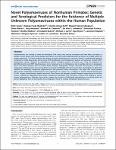Novel Polyomaviruses of Nonhuman Primates: Genetic and Serological Predictors for the Existence of Multiple Unknown Polyomaviruses within the Human Population
Scuda, Nelly
Madinda, Nadege Freda
Akoua-Koffi, Chantal
Adjogoua, Edgard Valerie
Wevers, Diana
Hofmann, Jörg
Cameron, Kenneth N.
Leendertz, Siv Aina J.
Couacy-Hymann, Emmanuel
Robbins, Martha
Boesch, Christophe
Jarvis, Michael A.
Moens, Ugo
Mugisha, Lawrence
Calvignac-Spencer, Sébastien
Leendertz, Fabian
Ehlers, Bernhard
Polyomaviruses are a family of small non-enveloped DNA viruses that encode oncogenes and have been associated, to greater or lesser extent, with human disease and cancer. Currently, twelve polyomaviruses are known to circulate within the human population. To further examine the diversity of human polyomaviruses, we have utilized a combinatorial approach comprised of initial degenerate primer-based PCR identification and phylogenetic analysis of nonhuman primate (NHP) polyomavirus species, followed by polyomavirus-specific serological analysis of human sera. Using this approach we identified twenty novel NHP polyomaviruses: nine in great apes (six in chimpanzees, two in gorillas and one in orangutan), five in Old World monkeys and six in New World monkeys. Phylogenetic analysis indicated that only four of the nine chimpanzee polyomaviruses (six novel and three previously identified) had known close human counterparts. To determine whether the remaining chimpanzee polyomaviruses had potential human counterparts, the major viral capsid proteins (VP1) of four chimpanzee polyomaviruses were expressed in E. coli for use as antigens in enzyme-linked immunoassay (ELISA). Human serum/plasma samples from both Côte d'Ivoire and Germany showed frequent seropositivity for the four viruses. Antibody pre-adsorption-based ELISA excluded the possibility that reactivities resulted from binding to known human polyomaviruses. Together, these results support the existence of additional polyomaviruses circulating within the human population that are genetically and serologically related to existing chimpanzee polyomaviruses.
Dateien zu dieser Publikation
Keine Lizenzangabe
Verwandte Publikationen
Anzeige der Publikationen mit ähnlichem Titel, Autor, Urheber und Thema.
-
2010-11-03ZeitschriftenartikelAfrican great apes are naturally infected with polyomaviruses closely related to Merkel cell polyomavirus Leendertz, Fabian; Scuda, Nelly; Cameron, Kenneth; Kidega, Tonny; Zuberbühler, Klaus; Leendertz, Siv Aina J.; Couacy-Hymann, Emmanuel; Boesch, Christophe; Calvignac, Sébastien; Ehlers, BernhardThe oncogenic Merkel cell polyomavirus (MCPyV) infects humans worldwide, but little is known about the occurrence of viruses related to MCPyV in the closest phylogenetic relatives of humans, great apes. We analyzed samples ...
-
2011-11-22ZeitschriftenartikelFicolin-2 Levels and FCN2 Haplotypes Influence Hepatitis B Infection Outcome in Vietnamese Patients. Tong, Hoang V.; Toan, Nguyen L.; Song, Le H.; Ouf, Eman Abou; Bock, Thomas; Kremsner, Peter G.; Kun, Jürgen F. J.; Velavan, T.P.Human Ficolin-2 (L-ficolins) encoded by FCN2 gene is a soluble serum protein that plays an important role in innate immunity and is mainly expressed in the liver. Ficolin-2 serum levels and FCN2 single nucleotide polymorphisms ...
-
2015-11-13ZeitschriftenartikelRecombinant Envelope-Proteins with Mutations in the Conserved Fusion Loop Allow Specific Serological Diagnosis of Dengue-Infections Rockstroh, Alexandra; Barzon, Luisa; Pacenti, Monia; Palù, Giorgio; Niedrig, Matthias; Ulbert, SebastianDengue virus (DENV) is a mosquito-borne flavivirus and a major international public health concern in many tropical and sub-tropical areas worldwide. DENV is divided into four major serotypes, and infection with one serotype ...

